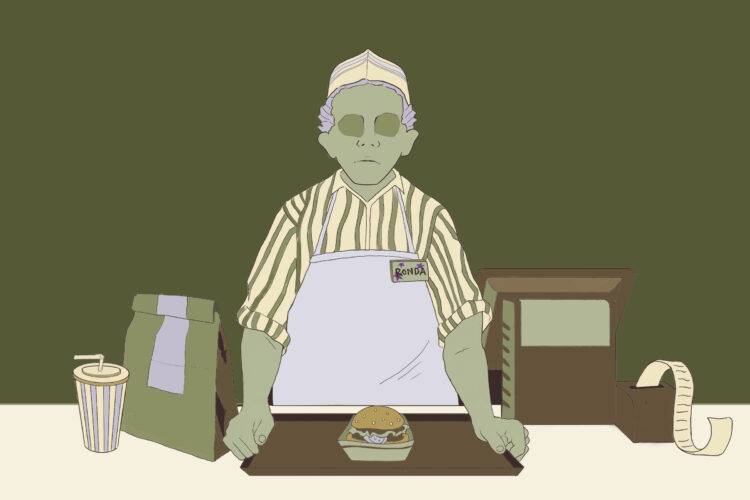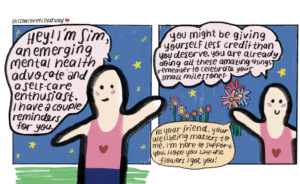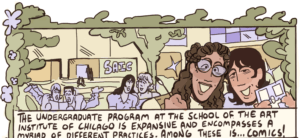
The man’s eyes at the register were black, and in them she saw only nothingness, as if inside him nothing raged and nothing ruled and if she were to split open his veins now upon the cash register and her two dollars and 39 cents in change, nothing would pour out in a deafening stream onto the white countertop and its grease-stained tiles and cover her body with his soul.
“The soda machine’s over there,” he said with a jerk of his head toward the black box against the wall. His whole body seemed very large to her, humongous and towering like a lone mountain; his head a hard-boiled egg salted with sparse gray hair. The stubble on his chin and his cheeks, she thought, was shockingly dark and flat against his pale skin. His nose reminded her of knotted tree roots and his small ears (grown so unfortunately close to his neck), pointed out like two tiny bulbous heads. His white apron was immaculately clean as was his red-and-white striped shirt beneath it; his bare, hairless arms almost seeming of muscle despite their mass and their size; soft, but coarse and cruel and mean. The white and pink hat he wore looked far too much like a paper boat with its shadowed crevices and wrinkles — the white of it shining out too starkly against his pale pink skin. His name-tag said, Ronda, decorated here and there with neon stickers that made Deborah’s eyes ache.
She realized that she’d been staring for far too long.
“The first guy I ever went out with called it soda,” she said, a little absentmindedly — perhaps too slowly, the words, she thought, coming out of her mouth at a slant, circling in the air before her eyes as a blaring yellow subtitle to her own stupidity — S-O-D-A. She watched him stand there and thought him very unaffected and stiff — sweaty, too; she noticed as the smell of burgers and fries and the heat of grills and fry-bats wafted over her face and stuck there like a cream.
“Needless to say, that relationship didn’t last very long.” She tried to laugh, moving her mouth as if her dry chuckles had made it to her tongue and not died in her throat. Her shoulders bounced up and down, the jean jacket she wore began to stick to her long, thin hair with static.
Still, the man only stood there and stared at her. Or rather, stared behind her, past her — maybe even, she thought, beyond these white and gray walls to green hills and heather meadows and purple streams glimmering in the sun with yellow butterflies gliding in the air and birds twittering in a sky so blue and so clear.
Suddenly, the sun broke through the thick, swollen clouds outside and burned into Deborah’s eyes, shining through the windows onto every wall and tile — the silver tables and red vinyl booths alighted. And for a moment, as the man handed her the much-too-large paper cup across the counter, Deborah swore he might really be seeing her. That he actually saw her.
She stared at him with her mouth somewhat agape and her snarly, yellow teeth on full display, and he slammed the paper cup down on the counter and yelled gruffly back into the chaos of the kitchen, “I’m going on break!” before tearing off his apron right there in front of her, with all the customers lined up behind her, the Ronda name-tag falling to the floor with a click-clack.
Deborah sat at the window and watched him smoke his cigarette outside through the dirty glass. She could see children’s little handprints and nose marks on the window, but she could not see the man’s face as he stared out toward the highway and the automated cars that sped along its cold concrete. The staffers came out from behind the counter and began singing happy birthday, to whom Deborah couldn’t tell — the Ronda name tag adorning another chest.
A child cried and screamed. Deborah ate her burger, but it all seemed to turn to ash in her mouth. There was no taste. It clumped together in her cheeks like a paste of salt and stale bread, sticking to the roof of her mouth. She’d pulled back her hair to eat, but still felt a tangled strand of it on her tongue. With her chipped, sparkly pink-polished nails, Deborah went in to pull it out. It was long, and she pursed her lips as it left her mouth. She thought of sword-eaters and then snake charmers as she watched the golden hair crawl out from her throat and flicked it to the floor with a quick wag of her finger. She stared at it there on the tiles, curled up like a worm dying on concrete and then glanced back out the window again. The sun had gone, the sky had turned back to gray, and the man was striding toward the highway, his body growing smaller and smaller, becoming a smear of red pulp as Deborah ate.







